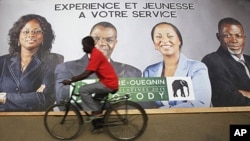On Sunday, Ivory Coast will vote in its first parliamentary elections since 2000, when former President Laurent Gbagbo first took power. Six months after his ouster, there is still the threat of violence but most Ivorians are looking to return to peace and prosperity.
In what is being called "the election to exit the crisis," President Alassane Ouattara's Democratic Party is poised to win the majority of the 255 parliament seats up for grabs. The Election Commission says almost 1,000 candidates are vying for those 255 seats.
With Gbagbo awaiting an International Criminal Court hearing in the Netherlands, some of his supporters have called for a boycott of the elections. This increases the Democratic Party's electoral odds, but also the threat of violence. On Wednesday, Ivory Coast officials say three people were killed and three wounded when a rocket was fired into a residential courtyard in the Grand Lahou region just before an election rally of supporters of President Ouattara.
Step toward reconciliation
At a press conference in Abidjan on Friday Bert Koenders, chief of the United Nations Operation in Côte I'voire (UNOCI), said the challenges are not as great as the opportunities.
Koenders says legislative elections have to be an important step towards national reconciliation. He says it is possible and will be a path to economic and social development in Ivory Coast, and it will be the priority after the elections.
Still, the Electoral Commission and its partners have taken extensive measures to ensure fairness and security. According to the UNOCI, there are over 150 international election observers. They join the Ivorian military and about 3,000 national observers, which is the same number killed in the country in the violence following last year's presidential election.
Koenders says they have made a very precise and detailed security plan that will comfort voters. He says that they have also conducted a thorough investigation into the country's problems and are aware of the problematic areas.
Chris Hennemeyer is a consultant for International Foundation for Electoral Systems, which provides technical support to the Electoral Commission. He believes any violence will be isolated and the biggest problems of the vote in the post-conflict country will be logistical.
"That's my concern, that all ballots and candidate lists and voting equipment is where it needs to be when polls open at 7:00 tomorrow morning," said Hennemeyer.
With hundreds of candidates running, it is a large undertaking for any government, especially one as young and tenuous as President Ouattara's. But Hennemeyer says the government is fortunate to have a population eager to return to its former economic and social standing.
"The Ivorians have really impressed me with how quickly they've gotten back to some semblance of normalcy here," he said. "I was here in July and the country was still a little bit tense. That's largely disappeared now. People have gotten back to work, back to business, and that's a good sign."
Hennemeyer added that the country still has a long way to go and many of its political problems will not be resolved by this election.




